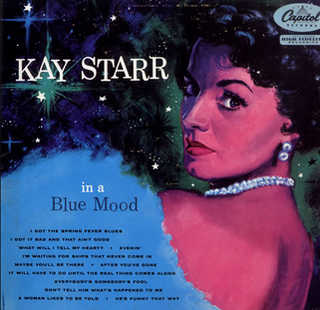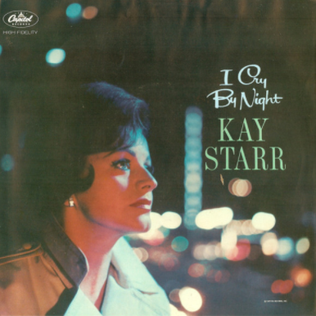
Harry "Sweets" Edison was an American jazz trumpeter and a member of the Count Basie Orchestra. His most important contribution was as a Hollywood studio musician, whose muted trumpet can be heard backing singers, most notably Frank Sinatra.
"Please Don't Talk About Me When I'm Gone" is a song published in 1930. It was written by Sam H. Stept with lyrics by Sidney Clare. The original publication also credited singer Bee Palmer as co-composer.

"The Nearness of You" is a popular song written in 1937 by Hoagy Carmichael with lyrics by Ned Washington. Intended for an unproduced Paramount film titled Romance In The Rough, the studio's publishing division Famous Music reregistered and published the song in 1940. It was first recorded by Chick Bullock and his Orchestra on Vocalion. Despite numerous accounts to the contrary, the song was never scheduled for and does not appear in the 1938 Paramount film Romance in the Dark.
"I Guess I'll Have to Change My Plan" is a popular song published in 1929, with music by Arthur Schwartz and lyrics by Howard Dietz.

Rock and Rollin' with Fats Domino is the 1956 debut album by rock and roll pianist and vocalist Fats Domino, compiling a number of his hits and other material, some of which would soon become hits. All included recordings have been released previously on Imperial Records singles from 1950 to 1956. The album, which featured a woodcut portrait of the musician, reached No. 17 on the Billboard "Pop Albums" chart. It is believed to have been produced by engineer Bunny Robyn due to the notation on the cover "A Robyn Recording".
The following is the discography for big band and traditional pop arranger Nelson Riddle (1921–1985).

Yes You Can is the third solo studio album by British singer-songwriter Steve Harley. It was released by CTE in Europe in 1992 and by Food For Thought Records in the UK on 4 May 1993.

"Swingin' Down the Lane" is a 1923 song composed by Isham Jones with lyrics by Gus Kahn. Jones' instrumental version was second to "March of the Wooden Soldiers" in the list of top songs for 1923. Other popular versions in 1923 were by Ben Bernie, and The Columbians.

Rockin' with Kay is a studio album by Kay Starr. It was released in 1958 by RCA Victor. It was her third album for RCA Victor.

Losers, Weepers is a studio album by Kay Starr. It was released in 1960 by Capitol Records. It was produced by Dave Cavanaugh. She is backed on the album by Van Alexander and his band. The album's liner notes state: "Kay Starr, working closely and skillfully with the musicians, so that each nuance of lyric, melody, and mood is carried out with full beauty and meaning."

Kay Starr: Jazz Singer is a studio album by Kay Starr. It was released in 1960 by Capitol Records. It was produced by Dave Cavanaugh, and the music was arranged and conducted by Van Alexander.

Movin'! is a studio album by Kay Starr. It was released in 1959 by Capitol Records. Produced by Dave Cavanaugh, it was her first album after returning to Capitol. While RCA Victor had her singing material with a pop orientation, the liner notes assert Capitol's intention to "reaffirm her status as a great jazz vocalist." She was backed on the album by an orchestra conducted by Van Alexander and a big band.

The One, The Only Kay Starr is a studio album by Kay Starr. It was released in 1956 by RCA Victor. It was her first album for RCA Victor after a decade with Capitol Records.

In a Blue Mood is a studio album by Kay Starr. It was released in 1955 by Capitol Records.

The Kay Starr Style is a studio album by Kay Starr. It was released in 1953 by Capitol Records. The album included Starr's No. 3 pop hit, "Side by Side". Originally issued as a 10-inch LP with eight songs, it was reissued in 1955 as a 12-inch album with four additional tracks.

I Cry by Night is a studio album by Kay Starr. It was released in 1962 by Capitol Records. In 2014, Universal Music Group made the album available on YouTube with 24 bit mastering.

One More Time is a compilation album by Kay Starr. It was released in 1960 by Capitol Records.

I Hear the Word is a studio album of inspirational songs by Kay Starr. It was released in 1959 by RCA Victor. Starr was backed up on the album by The Jimmy Joyce Singers and an orchestra conducted by Bill Stafford.

Just Plain Country is a studio album by Kay Starr. It was released in 1962 by Capitol Records. Ken Nelson was the producer. In 2015, the Universal Music Group made the album available on YouTube.

The discography of American singer Kay Starr contains 18 studio albums, 18 compilation albums, one live album, 87 singles, 12 other charting songs and one additional album appearance. Starr's first singles were released in collaboration with the Ben Pollack Orchestra. She signed to Capitol Records as a solo artist and had her first chart record in 1948 with "You Were Only Foolin' ". It reached number 16 on the American Billboard pop music chart. It was followed the same year by her first top ten pop single "So Tired". In 1950, "Bonaparte's Retreat" reached the top five of the Billboard pop chart. Starr reached the top five again with "Hoop-Dee-Doo" and "I'll Never Be Free".

















